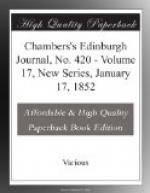Returning to England with the troops, it was offered to him to accompany, in the capacity of chief medical officer, Sir Ralph Abercromby’s expedition against some of the West India islands; and although no employment could possibly have been more agreeable to his taste, he, much to Sir Ralph’s chagrin, declined the flattering proposal, on the grounds, that lower terms had been offered to him than to another professional man. Nothing but a sense of professional delicacy, it is plain, governed him in this transaction, for he immediately afterwards embarked (April 1796) as second medical officer in another expedition to San Domingo. During his abode in this island, he was unwearied in enlarging his acquaintance with tropical diseases—observing the rule he had followed in Holland of noting down by the patient’s bedside the minutest particulars of every case he attended, the effects of the treatment pursued, and whatever else might shed light on the intricacies of pathological science. He also gave a larger practical operation to the scheme he had years before devised of amending the dietaries of military hospitals.
After the evacuation of San Domingo in 1798, our physician paid a visit to the United States, where he was received with signal distinction, his reputation having preceded him. The latter part of the year found him again at Stockton, publishing a work on contagious and endemic fevers, ’more especially the contagious fever of ships, jails, and hospitals, vulgarly called the yellow-fever of the West Indies;’ together with ’an explanation of military discipline and economy, with a scheme for the medical arrangements of armies.’ He undertook, about this time, by desire of Count Woronzow, the Russian ambassador, the medical charge of seventeen hundred Russian soldiers, who were stationed in the Channel Islands in a sad state of disease and disorganization; and so admirably did he acquit himself, and so perfect were the hospital provisions he made, that (1800) the commander-in-chief nominated him physician and head of the army-hospital depot at Chatham—as he says, ’without any application or knowledge on his part.’ This appointment was the cause of his subsequent misfortunes.
At Chatham, with the warm approbation of Major-General Hewett, commanding the depot, he introduced that system of hospital reform which had elsewhere operated so successfully. The changes he effected, as soon as they were made, became known to the Medical Board, and were publicly approved of by one of its members. However, shortly afterwards, an epidemic broke out in the depot (then removed to the Isle of Wight), arising from the fact, that the barracks were overcrowded with young recruits, but which the Medical Board ascribed to Jackson’s innovations, and reported so to the Horse-Guards. The commander-in-chief directed an inquiry to take place before a medical board impannelled for the purpose, and the result of that inquiry may




